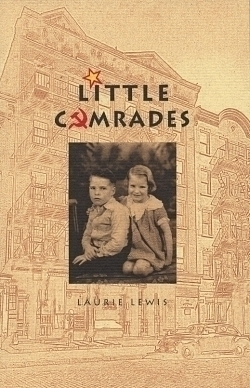Little Comrades
- 2011 INDIES Finalist
- Finalist, Autobiography & Memoir (Adult Nonfiction)
Gertrude Stein said, “Communists are people who fancied that they had an unhappy childhood.” In Little Comrades, the author doesn’t fancy she had an unhappy childhood; she did. From birth, Laurie Lewis and her older brother were thrust into Communism because their father was a high-ranking official. She was fearful and confused amidst the burgeoning movement in Canada during the 1930s, and lived in a chaotic household fueled by her father’s alcoholism. Unknowingly participating in illegal party activities, and subjected to a nomadic lifestyle, Lewis survived the sometimes abusive childhood created by her parents, Ellen and Lawrence.
Her memoir is divided into two parts: the first focuses on her life in Canada, and the second chronicles her move, at sixteen, with her mother to New York City. In the first part, Lewis’ early memories are dispensed in fragmented paragraphs that establish a disjointed narrative; they’re frank, but nonlinear, which detracts from the emotional impact of her story. Once she and her mother arrive in New York, the narrative becomes much more concise. Ultimately, their relationship takes priority over the theme of Communism in the book, engaging the reader on a deeper level.
Although the time line is confusing, Lewis ably presents the hypocritical aspects of having Communist parents. For instance, the kids address their parents on a first-name basis and regularly converse with adult comrades. But they also have to obey their parents’ decisions without question, only to suffer punishment for any perceived failure. Expected to be an adult and a child simultaneously shapes Lewis into a young adult before she is ready and sets up a bizarre sexual relationship with the male comrades she meets, including her mother’s lover.
The fact that the family moves constantly initially prohibits Lewis from making many female friends, so her mother becomes her confidante. Their life together in New York is fascinating, filled with politics and brushes with celebrity. This is also where Lewis finally grows into herself. She is allowed to take advantage of her own intelligence and develop friendships outside of her mother’s circle.
Little Comrades is a unique contribution to the crowded field of memoirs and offers a truly interesting version of an unusual childhood. It details the universally complicated ties between mother and daughter and the power of resilience amid the less well-known daily life of a Communist family in the West.
Reviewed by
Monica Carter
Disclosure: This article is not an endorsement, but a review. The publisher of this book provided free copies of the book and paid a small fee to have their book reviewed by a professional reviewer. Foreword Reviews and Clarion Reviews make no guarantee that the publisher will receive a positive review. Foreword Magazine, Inc. is disclosing this in accordance with the Federal Trade Commission’s 16 CFR, Part 255.


